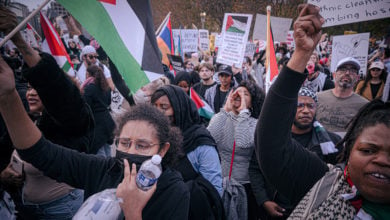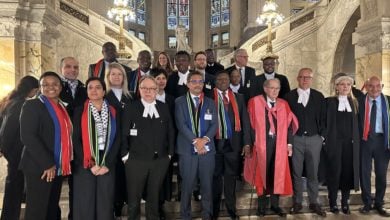The recent capture of key cities, towns and military installations in Syria by opposition forces have led to a marked change in the momentum of the civil war. While the Syrian government had previously appeared to have the upper hand, the situation has become more dangerous with the tide shifting in favor of right wing and pro-imperialist rebels.
The most significant battlefield development came at the end of March, with the capture of the major northern city of Idlib by the newly formed Army of Conquest rebel alliance. Idlib is only the second provincial capitol lost by the government over the course of the war – the other being Raqqa, the de-facto capitol of the so-called Islamic State caliphate. The rest of the province fell into opposition hands over the following two months.
The Army of Conquest is a coalition of many armed groups, united by their common Salafist political orientation. Salafists advocate Islamic theocratic rule and generally views non-Sunnis as heretics. Al-Nusra Front, the Syrian affiliate of al-Qaeda, is a leading force in the alliance.
In central Syria, the Islamic State, which shares the Army of Conquest’s ideology but are rivals in the war, made a significant breakthrough with the capture of Palmyra. Known for its ancient ruins, the city fell in late May when government forces were forced to withdraw.
IS forces are now stalemated in fighting with rival rebels around Aleppo and Kurdish forces in the northeast. However, the capture of Palmyra, in addition to the tragic capture of the Yarmouk Palestinian refugee camp in April and Ramadi in Iraq in May, shows that the bombing campaign carried out by the U.S.-led coalition has so far failed to significantly weaken IS.
In the south, government forces suffered another setback when the 52nd mechanized brigade’s base, one of the largest military installations in Deraa province, was captured by the Southern Front rebel grouping. This has heightened the danger for the nearby Druze community of Syria, which is generally pro-government and fears a massacre at the hands of the Salafist opposition because they are not Muslims.
The Southern Front itself, however, is not Salafist but instead aligned with the Free Syrian Army, a U.S.-backed entity that aims to bring Syria into the western imperialist orbit. Although the Saudi-backed Islamic Front also took part in the capture of the base, this is a much needed boost for U.S.-sponsored rebel factions. Harakat Hazm, a main recipient of advanced U.S. weaponry, dissolved itself earlier this year after a string of military defeats.
Pro-government forces launch offensive in Qalamoun
Despite numerous setbacks, forces supporting the Syrian government have gone on the offensive in region around the Qalamoun mountans near the border with Lebanon. The battle is a joint operation between the Syrian army and the Lebanese resistance organization Hezbollah, which joined the war on the side of the government in 2012.
The offensive is ongoing and so far has been largely successful. The main opposition groups holding territory in Qalamoun are al-Nusra Front and IS – both have suffered heavy losses.
Qalamoun is strategically important for several reasons. Control of the area allows pro-government forces to keep supply lines open between the capitol Damascus and the coastal area around Latakia in the northwest, where members of the Alawite religious minority are concentrated and face atrocities at the hands of the opposition. It also allows Hezbollah to set up a buffer zone around Lebanon, which is threatened by both internal and external Salafist forces that aim to exploit the deep political and communal divisions in the country.
Saudi-Turkey thaw breathes life into the opposition
The two principal patrons of Salafist forces in Syria, the dominant trend in the opposition, are the governments of Saudi Arabia and Turkey. The two have been politically at odds for years, but a thaw in relations has facilitated the recent battlefield victories for opponents of the Syrian government and raises the prospects for greater unity and effectiveness amongst rebel factions.
When the wave of Arab Spring uprisings swept the Middle East in 2011, the Turkish government bet on the success of the Muslim Brotherhood, a center-right Islamist grouping that has much in common ideologically with Turkey’s ruling Justice and Development Party. The “zero problems with neighbors” policy devised by then-Foreign Minister Ahmet Davutoglu gave way to an aggressive push to assert the country’s role as a dominant regional power.
Saudi Arabia, on the other hand, views the Muslim Brotherhood as a principle internal threat. The group supports democratic elections in the context of a religiously-influenced capitalist state, something intolerable to the despotic Saudi monarchy.
Although the Arab Spring revolts were generally started by ideologically eclectic groups of liberal and leftist-leaning youth, the Muslim Brotherhood was initially the main political beneficiary. Through its superior organization and deep base of support, the MB-backed candidate, Mohammad Morsi, became President of Egypt. However, Morsi was overthrown in a coup in 2013 and replaced by General Abdel Fattah al-Sisi.
Saudi Arabia extended massive financial assistance to Sisi’s new regime, offsetting the consequences of the disapproval of the coup expressed by the U.S. government, which had hoped to facilitate an MB-military alliance. Turkey condemned the coup and Saudi-Turkish relations sunk to a new low.
However, the Obama administration’s efforts to reorient U.S. strategy in the Middle East towards a partnership with Iran has changed the calculations of the Saudi ruling class. When King Salman bin Abdulaziz assumed the throne at the beginning of the year, he sought to realign Saudi diplomacy in a way that would boost his regime’s chances of surviving in a situation of limited U.S. patronage.
Iran, Saudi Arabia’s main regional rival, is a crucial ally of the Syrian government and would be seriously weakened if it were to be overthrown. Combating the Muslim Brotherhood took a backseat to Saudi efforts to forge an anti-Iran alliance of Sunni-majority Arab states, which includes Turkey. There are still sharp differences between the Turkish and Saudi governments on Egypt, but the two have also found themselves on the same side in the civil war in Yemen, where the MB-linked Reform Party supports Saudi-backed Prime Minister-in exile Abd Rabbo Mansour Hadi.
The Army of Conquest alliance that captured Idlib is in large part a product of Saudi-Turkey rapprochement. Previously divided by competing loyalties to Turkish or Saudi patrons, the Salafist forces have forged an unprecedented degree of unity and achieved a breakthrough on the battlefield. This is a grave threat to the people of Syria.
The overthrow of the Syrian government would without a doubt be a welcomed development for U.S. imperialism. It has been targeted for regime change because it follows an independent foreign policy and has not forfeited Syria’s national sovereignty to the west.
The U.S. government’s human rights rhetoric is entirely hollow – it has backed countless regimes around the world that violently repress its opponents (Saudi Arabia, for one) and makes decisions with the fundamental objective of securing a dominant position for U.S. capital. Its intervention has prolonged a conflict that has taken upwards of 300,000 lives and ripped apart the fabric of Syrian society.
However, the development of the war since the U.S. government backed down from its plan to bomb Syria in 2013 underlines a central dynamic driving events in the Middle East – the declining hegemony of U.S. imperialism. Bitterly disappointed at the caution displayed by the Obama administration, furious at its efforts to sign an agreement with Iran on the country’s nuclear program and aware of the emergence of rising global powers hostile to the U.S.-led world order, the traditional clients of U.S. imperialism in the region have increasingly sought to take matters into their own hands. The rebel factions most directly backed by the United States have seen their influence diminish, while the Salafist forces aligned with Turkey and Saudi Arabia have supplanted them as the leading trend in the opposition.
If current trends continue, the future of Syria may be determined more in Ankara and Riyadh than Washington. Progressive people around the world need to do everything they can to make sure these decisions are made by no one other than Syrians.






